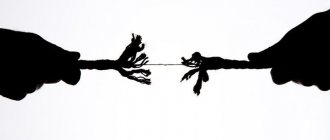This is often easier said than done, since the “rapist” may have all the levers of power: for example, he is the only one in the family who earns money or even controls any movements of family members and their communication with the outside world.
Since the aggressor does not at all need his victim to make independent decisions or be able to speak freely, she herself has to look within herself for the strength and resources to counteract emotional violence.
First and foremost, it is important to develop your confidence and communication skills. Unless you are also at risk of physical abuse, it is important to find the right words to adequately respond to emotional abuse.
What's next?
These are not magic spells and you will most likely encounter resistance. But you have to start somewhere. To set clear boundaries and reach the emotionally abusive person, you will need to learn to constantly communicate with him seriously, in an adult way, and think through your words.
Practice. If the above answers (paraphrased to suit your specific situation) help, use them. Words have great power and can change a lot. Not all emotional abusers will be able or willing to change, but some will eventually begin to change their behavior.
Only you can set the limits of your patience and ultimately decide whether it's time to cut this person out of your life altogether. In the meantime, find the right words for yourself that will give you strength.
How to Know if You're an Emotional Abuser Before the Relationship Goes Too Far
We have already told you what checklist you can use to determine that you are a victim of domestic violence , and Russian-speaking women shared with us stories about how they survived it .
Now, with psychologist Svetlana Okhotnikova, we tried to figure out how to recognize a potential abuser and protect our personal boundaries before the situation becomes critical.
Sign 1: Caring becomes obsessive
The most important sign to pay attention to is internal discomfort around your partner. There is a certain difficulty here: a woman* may not notice this sign for a long time if, for example, in her family it was customary to treat a woman as a second-class creature. Therefore, in the initial stages it will be difficult for her to recognize the violation of boundaries. And when everything goes too far, it will be difficult to get out.
In healthy people, this vague feeling is expressed as “damn, something is wrong.” For example, the question “Why did you go there and when will you return” is harmless, it can be a sign of concern or concern. The problem begins when this concern becomes obsessive and your explanations are no longer sufficient. Then you begin to feel discomfort when you are going somewhere, knowing that you will have to explain everything to your partner.
Anyone, even the healthiest person, can fall into such a relationship. There is an opinion that abusers look only for weak and submissive victims, but this is not true.
Do not confuse the concepts of caring and violating boundaries. For example, being followed or making inappropriate comments or suggestions about your appearance (“Why don’t you lose weight?”) are signs of emotional abuse. There is a wonderful answer to all this: “My body is my business.”
It's the same with bad habits. The abuser may insist that you quit smoking, under the guise that he is doing it for your sake. But in reality, he will rummage through your purses, sniff and make scandals. Of course, a normal partner can also tell you that he would be very happy if you got rid of your addiction, but this will be done once and without pressure.
Sign 2: boundaries are violated systematically
We must understand that there is no clear division into abusers and non-abusers. We all sometimes violate other people's boundaries. However, only someone who does this intensively, rudely and systematically can be called an abuser. We can say that such a person is driven by a strong desire to gain control, to eat off a piece of another person. In communication they are easy to recognize because instead of “I-messages”, which convey personal, subjective feelings and wishes, they use “you-messages”. For example: “It’s your fault,” “If you hadn’t done that...”
Sign 3: “prince on a white horse”
Abusers often attract victims by guessing their thoughts, anticipating their desires, impressing them with attentiveness - and then starting to arrange an “emotional swing” (more on this below). When these people choose a person with whom they will build the right relationship, they begin to take a closer look at him and demonstrate the abilities of a psychologist. They conquer you very intensely. Many women have the impression: “Well, here he is, finally, my man. He knows everything about me, he breathes the same air as me. He knows my preferences, remembers all our conversations.” Relationships are developing rapidly and so dizzyingly that it looks like a movie or a fairy tale - this is the danger. Intimacy usually develops gradually.
The sooner a man invites you to move in with him, get married, have children, and move to the Maldives, the more suspicious it should be. The faster, the worse. But patriarchal society, raised on the movie “Pretty Woman,” often thinks the opposite.
Of course, speed may simply be a consequence of temperament, but you still need to be on guard, because abusers have such a task - to turn a person’s head.
Sign 4: “emotional swing”
If you look at the impressions of abusers themselves, who are aware of their behavior and analyze it, they often admit that the period of courtship is their least favorite: they have to pretend. And their favorite stage is the “emotional swing”.
It begins after the abuser has gained you into his network. They say to you: “Darling, I want to spend all my time with you. I can’t live without you for a minute.” The predator tries to merge with the prey. Lives by her interests, joins her group of friends. Shares her hobbies with her. Then follows: “I will go with you to your friends.” And he goes to study them too, to find out what you are talking about. He will definitely charm them and please them. And then to your parents.
The sooner a man invites you to move in with him, get married, have children, and move to the Maldives, the more suspicious it should be.
The woman begins to live in a state that she is amazingly lucky. And here the same “swing” begins: let’s say, a game of silence. He came home and suddenly became silent for no particular reason. The woman finds no place for herself: “What’s wrong with you? What did I do wrong?” And in response he hears an irritated: “Nothing. Everything is fine". Then it turns out that she missed a call from him. And one day he will come and hit her in the face with the words: “I told you not to miss calls.” And any little thing can become such a reason.
Sign 5: Feelings of shame and guilt
Abusive relationships are often closed relationships from society. They don’t talk about this because it’s a shame: he’s so perfect! What if they accuse you of something being wrong with you? What if they say that it’s the fool’s own fault? And in our culture there is also a stereotype about “dirty dirty laundry.”
The more a woman endures, the fewer good periods there are in the relationship.
Sign 6: “sugar shows”
The situation is complicated by the fact that after a quarrel, abusers often stage so-called “sugar shows.” That is, a woman feels that something is wrong, she breaks down, quarrels with her partner, she threatens to leave. And then he begins to give flowers, apologize profusely, and recreate the beginning of the relationship. And the woman blossoms: he has changed. Or even worse, the illusion arises: “I can change him. Me and no one else!” Gradually, she begins to develop signs of Stockholm syndrome and other personality changes. A woman’s self-esteem drops, she becomes more anxious, irritable, and indecisive. It becomes increasingly difficult to leave.
Sign 7: avoiding honest dialogue
A woman with low self-esteem perceives an apology as a relief. Only someone who is still in the middle of a relationship, who is not mired in it and can stand up for herself, can get out on her own. Call for a conversation, they say, if you rummage through my phone, we will have problems. A healthy person will agree and apologize. The abuser will go on the attack: “Look at yourself before blaming me.” Or he will condescendingly say: “Baby, what nonsense! Do you have secrets from me?” In a word, he will refuse an honest, open dialogue.
How to defend yourself?
The main thing is to know that such people exist. Knowing that asserting your boundaries is normal and important. That it's good for relationships. That if you don't fight for yourself, you will lose yourself. You will forget who you are, what you love and what you want. You will be an adult woman who behaves like a little girl, because all her desires are dissolved in her partner: “Oh, I’m such a fool. And Vitenka is so smart! Vitenka, what do I like more, latte or cappuccino?”
You also need to know that anyone, even the healthiest person, can get into such a relationship. There is an opinion that abusers look only for weak and submissive victims, but this is not true. There are perverted narcissists who deliberately look for bright and charismatic people to play the role of victim. They are attracted to people with high vitality - lively and energetic. They will do everything to get these people into their relationships, and then they will begin to tighten the screws, gaining power and control.
It is important to understand that in Western society there is a taboo against physical aggression. If Russia has its own peculiarities of the cultural code (“hitting means loving”, “beating a woman with a hammer - the woman will be gold”), then in Britain it is different. You are in another country, where different rules apply - and even if you have no loved ones here, you should not tolerate anything.
Where to contact
For help, you need to contact shelters or call hotlines (see list below). In England, women's rights are protected by social services, police, and charitable foundations. Most often, a woman herself is afraid to ask for help, but it is necessary. It is important to overcome shame and tell your loved ones: it is important for another person to witness what is happening to you. This will add reality to what is happening. You can also keep a diary in which to write everything down: abusers like to convince you that you are wrong, it seemed to you that in reality everything was completely different from how you remember (this is called “gaslighting” ).
It is better to contact a psychologist individually, not as a couple. In relationships where one partner is abusive, couples therapy can be dangerous. Because in such couples the protocol of work is completely different than just with a couple who is going through a crisis. Usually at sessions it is customary to divide responsibility in half and admit guilt to everyone. And if you go to such a session with an abuser, then he can then use what he heard against his partner: “You are to blame for this too,” “Look, even a psychologist told you.”
Even if you have no loved ones in a foreign country, you should not tolerate anything.
If you can’t get access to individual therapy and are afraid to contact foundations, read more on this topic. For example, there is a wonderful book by Tanya Tank “Fear, I’m with you.” Also helpful may be "A Day by Day Out of Codependency" by Melody Beatty, "Healing from Trauma: A Survivor's Guide to Understanding Your Symptoms and Reclaiming Your Life" by Jasmin Lee Cori. The topic of domestic violence has also often come up in popular culture lately. For example, in the series “Big Little Lies” starring Nicole Kidman.
Useful phone numbers and links:
0808 2000 247 is a free 24-hour line for anyone experiencing domestic violence.
0808 801 0327 – line for male victims. Open from Monday to Friday from 10.00 to 13.00 and from 14.00 to 17.00. More information: www.mensadviceline.org.uk
0300 999 5428 – line for members of the LGBT community. Open on Monday from 14.00 to 20.00, on Wednesday from 10.00 to 17.00 and on Thursday from 14.00 to 20.00.
More information: www.broken-rainbow.org.uk.
0844 8044 999 is a free 24-hour line for legal advice on domestic violence.
More information: www.ncdv.org.uk.
0808 802 4040 – a line for those who feel that they themselves are a source of psychological and/or emotional abuse. Open from Monday to Friday from 10.00 to 13.00 and from 14.00 to 17.00.
More information: www.respectphoneline.org.uk.
*In this article, we use the word “woman” to refer to the victim because women are more likely than men to be victims of emotional abuse. But a man can also be a victim, and a woman can also be an abuser.
More interesting articles are on our Telegram channel: t.me/zimamagazine.com
Isolation from others
A person prone to emotional abuse will try with all his might to protect his victim from close contact with people. This happens because of the desire for control and the fear that others will notice something is wrong and begin to actively “save” the victim of an unhealthy relationship. This is also a way to convince a partner that only the rapist will care and worry about him.
There are several signs that your partner is trying to isolate you from others:
- he often discourages you from going out with friends or family;
- he restricts your ability to move by holding your money or car;
- he gets angry or makes you feel guilty if you meet someone you know;
- he insists on always being there for you if you're seeing someone.
When we are isolated from others, we have no opportunity to receive support and protection from them. Control on the part of the abuser increases, as does dependence on him. The longer such a relationship lasts, the more difficult it is to get out of it.
Types of psychological abuse you need to know
According to medicalnewstoday.com, psychological abuse takes many forms and falls into one of several categories depending on what the abuser is trying to do. For example:
- Humiliation, devaluation, criticism
- Control
- Shame
- Ignoring
- Blame, gaslighting and denial
- Emotional isolation
Let's consider the signs by which one or another type of psychological influence on a woman can be recognized.
The cycle of abusive relationships
Psychological abuse is not a one-time occurrence. If your partner once broke down and started screaming, then you should not immediately look for a family psychologist. Most likely, this problem can be easily dealt with on your own. But if unpleasant situations are repeated again and again, you cannot do without the help of a psychologist.
If you recognize the phases of psychological abuse in a relationship described below, be sure to schedule a consultation. It is better to hear from a therapist that you are exaggerating the problem than to delve deeper into an unhealthy relationship.
You can focus on the following phases.
- Minor conflicts, increasing tension.
The abuser makes emotional attacks towards the victim and creates conflicts out of the blue. The atmosphere between the partners is oppressive. The victim is afraid of the situation escalating, so he tries to be obedient, even ignoring his own interests.
- Aggravation of the conflict.
The accumulated tension does not disappear, but escalates into actual physical or sexual assault. The abuser resorts to open insults. The phase can last a few minutes or several days. It is at this stage that the greatest damage is done to the victim’s self-esteem and psychological state.
- Reconciliation.
As soon as the victim reaches the extreme point and announces a break in the relationship, the abuser repents and demonstrates love and attention. If promises to change are accepted, then a “calm” stage follows, after which minor conflicts begin again.
Abusive relationships are difficult to identify on your own, especially if there is no evidence of physical violence. If in doubt, consult a psychologist. You can find a specialist on our website.











